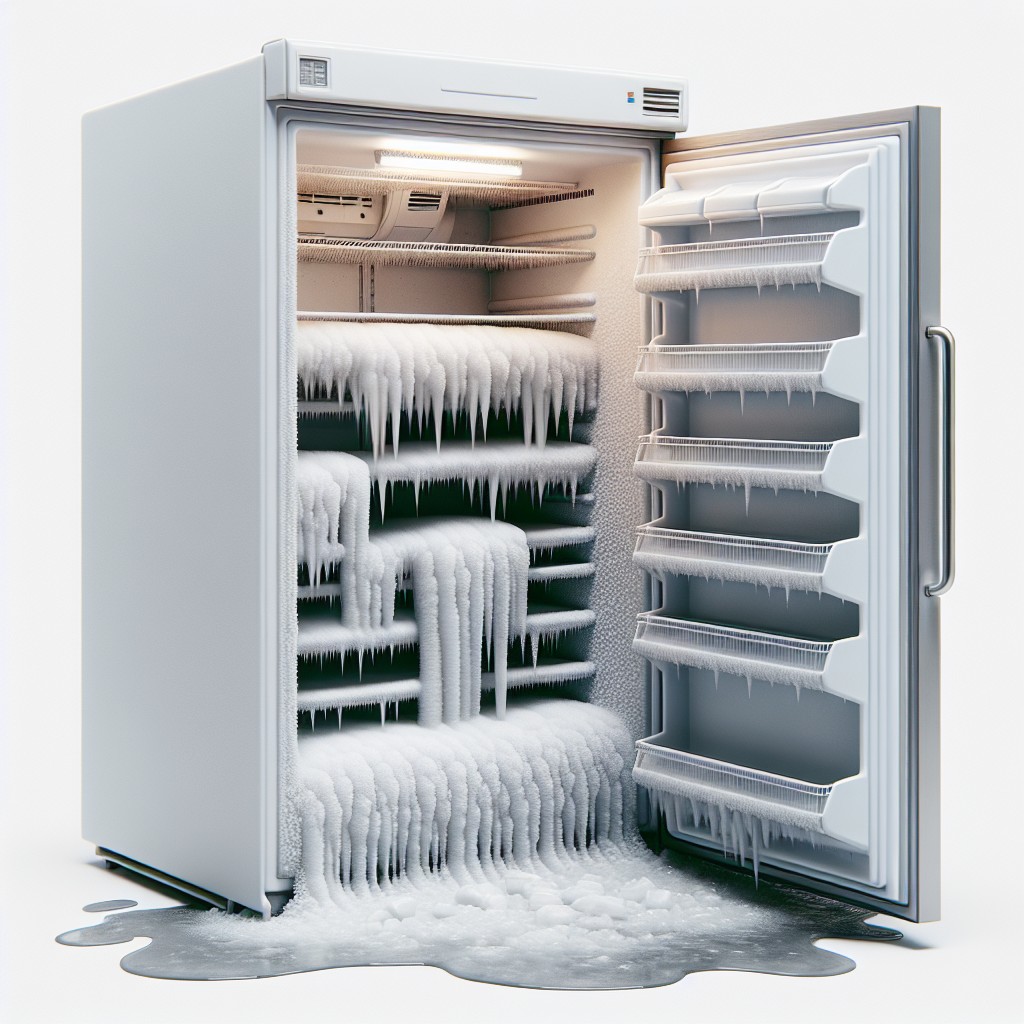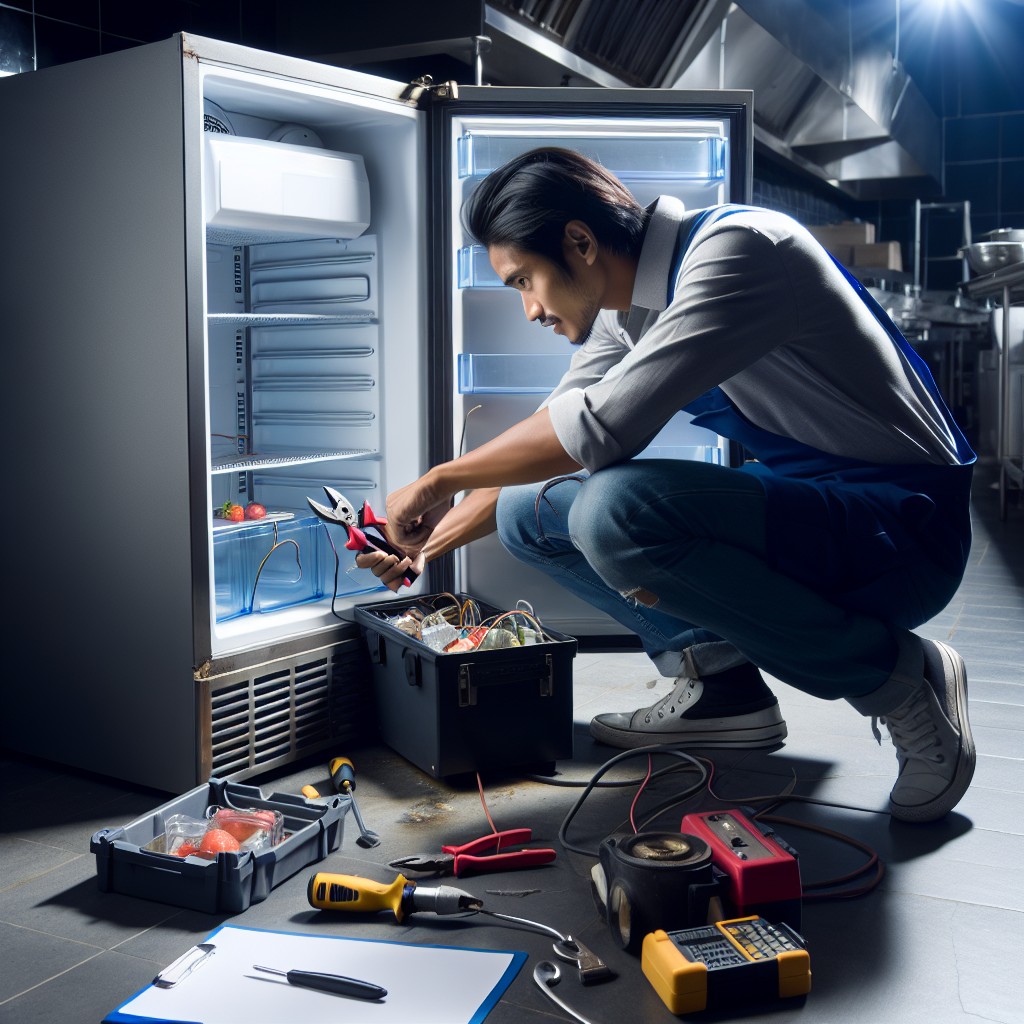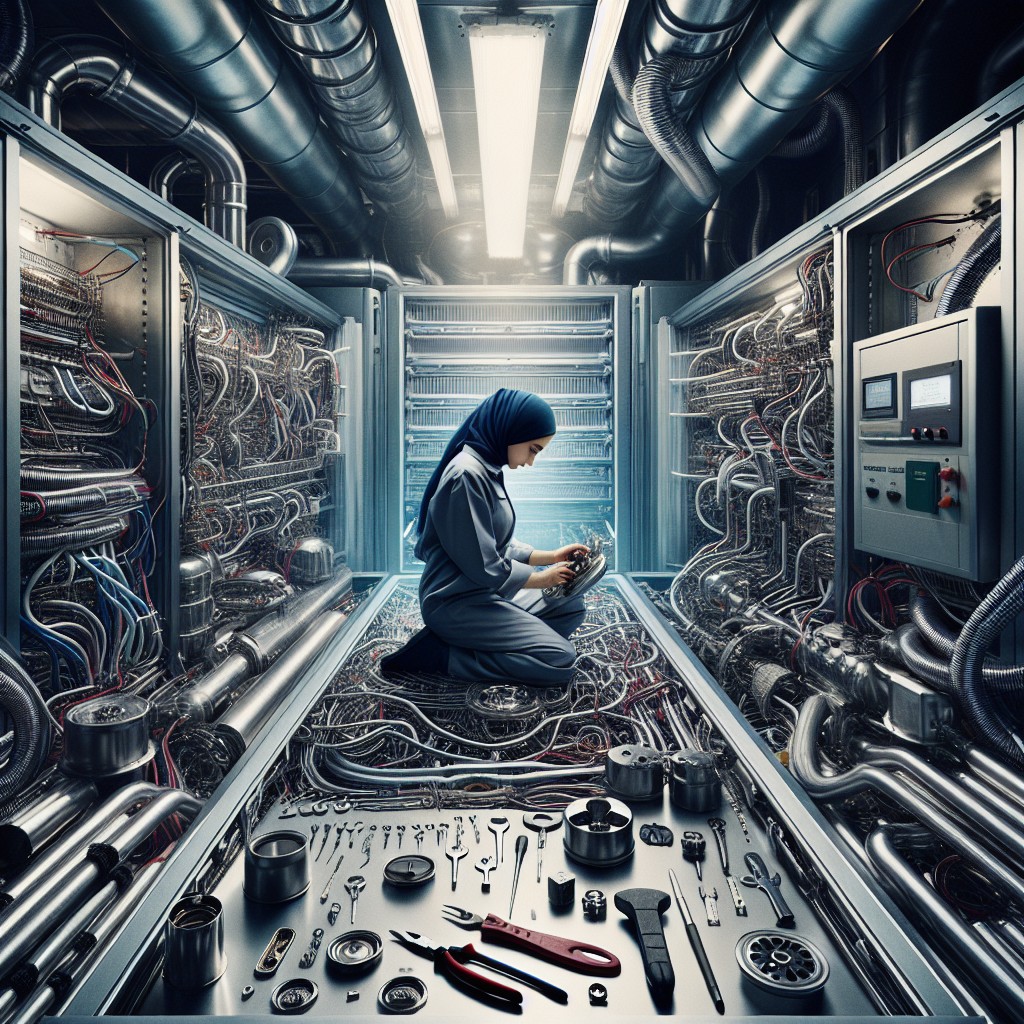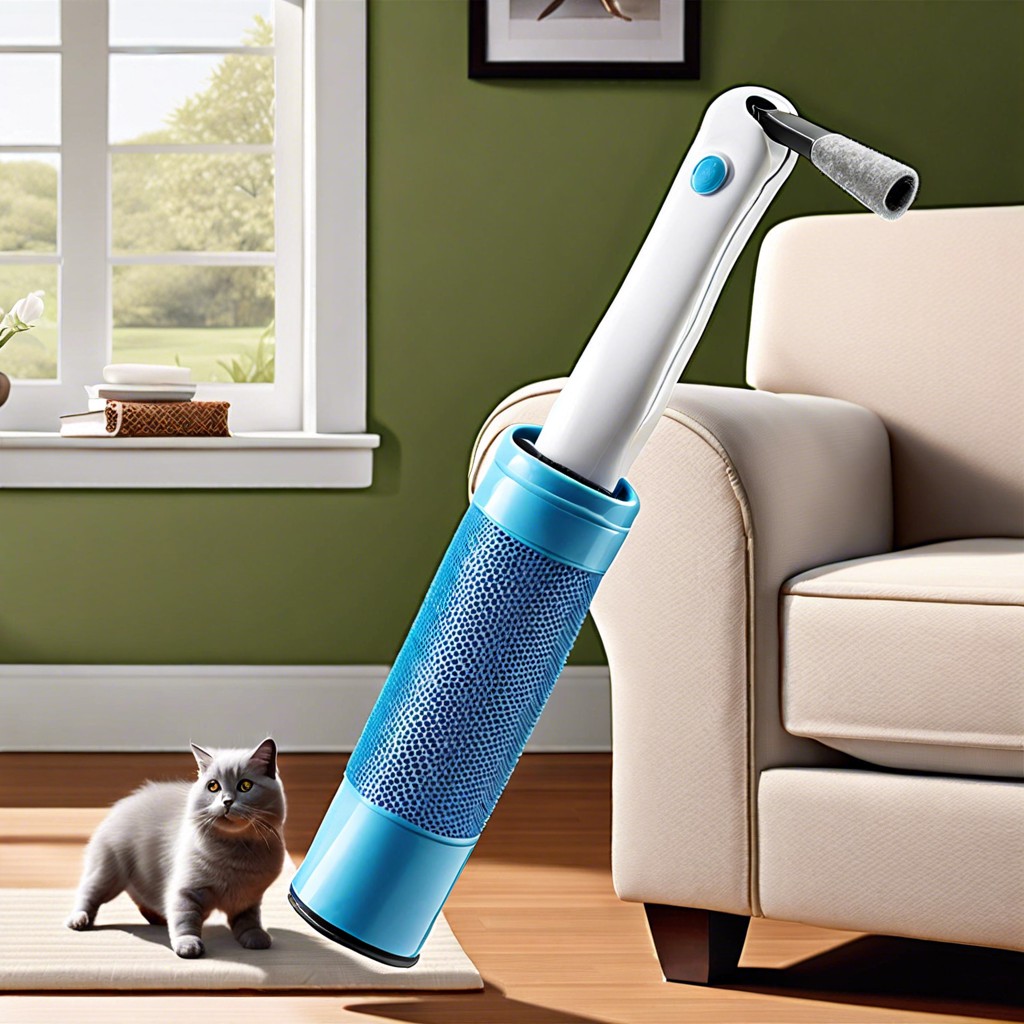Last updated on
Understanding the intricacies of commercial fridge repair is essential because a malfunctioning unit can spell disaster for any business.
Key takeaways:
- Detect early signs of malfunction: changes in temperature, unusual noises, frost build-up, energy bill spikes, water leaks.
- Take immediate action: check power supply, inspect thermostat and door seals, clear ventilation areas, listen for unusual noises, avoid overstocking, record temperature.
- Choose qualified repair services: certified technicians, industry compliance, efficient troubleshooting, original manufacturer parts, extended lifespan.
- Common commercial refrigerator repairs: thermostat issues, refrigerant leaks, worn door seals, compressor problems, evaporator and condenser coil malfunctions, clogged drain lines.
- Maintenance tips to avoid frequent repairs: regular cleaning, check and clean fan blades, monitor door seals, ensure level, inspect and clean drainage systems, schedule professional inspections.
Table of Contents
Signs Your Commercial Fridge May Need Repair

Detecting early signs of malfunction in your commercial fridge can save you from costly food spoilage and business interruption. Be alert for changes in temperature; if your fridge is not maintaining the set temperature consistently, it could indicate failing components.
Unusual noises such as humming, buzzing, or clicking are often telltale sounds of mechanical issues. Frost build-up beyond normal levels, especially around the evaporator coils, suggests a potential defrosting problem. Energy bills that spike unexpectedly can be a red flag for inefficient fridge operation needing attention.
Also, if you observe water leaks around the unit, it could point to a blocked drain line or other seal-related issues. By keeping an eye out for these indicators, you can address repairs promptly and keep your commercial fridge running efficiently.
Immediate Actions to Take When Your Commercial Fridge Malfunctions

If your commercial fridge is not functioning properly, prompt action is essential to prevent food spoilage and business interruption. Follow these steps:
- Check the power supply: Make sure the fridge is plugged in and the circuit breaker hasn’t tripped.
- Inspect the thermostat: Ensure it’s set at the correct temperature. If it’s too high, lower it to the appropriate level.
- Verify door seals: Look for gaps or tears in the seals that could be letting cold air escape.
- Clear ventilation areas: Remove any obstacles blocking air vents to improve circulation.
- Listen for unusual noises: Odd sounds can indicate mechanical issues that require professional attention.
- Avoid overstocking: Overfilling the fridge can obstruct airflow and strain the cooling system.
- Record the temperature: Note the internal temperature of the fridge to help diagnose the issue.
By taking these steps, you can identify some common issues and possibly prevent further damage until a repair technician arrives.
The Importance of Choosing Qualified Repair Services

Selecting proficient technicians to address your commercial fridge issues is essential for several reasons. Firstly, qualified professionals have the necessary certifications and training to diagnose and repair complex refrigeration problems accurately. They are adept at handling various models and brands, ensuring your equipment is in knowledgeable hands.
Secondly, experienced service providers comply with industry standards and regulations, which is critical for food safety and business compliance. Their adherence to these standards helps prevent potential fines or legal issues arising from improper maintenance or repair.
Moreover, technicians with specialized training in commercial refrigeration can often efficiently troubleshoot and solve problems, minimizing downtime for your business. This expedited service means your operations can return to normal swiftly, preserving inventory and maintaining customer satisfaction.
Furthermore, when choosing a repair service, it can be wise to consider those that can offer complete solutions. This can include repair, maintenance plans, as well as advice on optimizing equipment’s performance. To ensure that you’re making an informed decision, check out a professional’s website to learn more about services that can accommodate their needs.
Lastly, using qualified repair services can extend the lifespan of your equipment, as these experts are likely to use original manufacturer parts and execute repairs that align with the fridge’s design and function. This attention to detail and quality assurance translates into cost savings over time, as it reduces the likelihood of recurring issues and emergency repairs.
Typical Commercial Refrigerator Repairs

Common issues with commercial refrigerators often stem from wear and tear or component failure. Thermostat issues, for instance, can lead to inconsistent temperatures, jeopardizing food safety. Refrigerant leaks are another usual suspect, causing the fridge to struggle to maintain the required coolness.
Additionally, worn door seals might seem like a minor inconvenience but can significantly impact the unit’s efficiency, resulting in increased energy consumption and stress on the system. Compressor problems are usually more serious, potentially leading to complete system failure if not addressed quickly.
Evaporator and condenser coil malfunctions can decrease the unit’s ability to expel heat, preventing proper cooling. Finally, clogged drain lines can lead to water leaks and might be indicative of deeper issues within the refrigerator. These repairs, while common, require a professional assessment to ensure they are addressed correctly and to maintain the longevity of the equipment.
Maintenance Tips to Avoid Frequent Repairs
Regular cleaning is crucial. Dust and debris can accumulate on condenser coils, leading to inadequate cooling and system overload. Monthly cleaning ensures efficient operation and extends the unit’s lifespan.
Check and clean fan blades to maintain proper airflow. A gentle wiping with a damp cloth can prevent dust buildup, which can impede fan function and cause motor strain.
Monitor door seals (gaskets) for wear and tear. A tight seal keeps cold air in, reducing energy consumption and overworking of components. Replace any seals that are cracked or brittle to maintain efficiency.
Ensure the fridge is level. An uneven fridge can lead to misaligned doors, sealing issues, and uneven cooling. Use a spirit level and adjust the legs accordingly.
Inspect and clean drainage systems regularly. Blockages in the drainage can lead to water build-up and may cause components to fail prematurely.
Schedule professional inspections. An expert can catch and address issues early, preventing costly repairs down the line. Annual check-ups can help keep your system running smoothly.
Keep an accurate record of temperatures. Tracking temperatures helps to identify fluctuations early. This vigilance can be indicative of a problem that could be less costly if caught early.
Avoid overloading the fridge. Overstocking can obstruct airflow and strain the cooling system. Organize contents for optimal air circulation and compliance with food safety standards.
Adhering to these practices fosters a preventative approach, reducing the possibility of unexpected breakdowns and ensuring the longevity and reliability of your commercial refrigeration equipment.
Understanding the Costs of Commercial Fridge Repair
The cost factors of repairing a commercial fridge are diverse and can vary widely based on a number of variables. Here are key components that influence pricing:
- Parts: Specific parts may need replacement due to wear or failure. Common components like thermostats are less expensive, whereas compressors are at the higher end.
Labor: The technician’s time and expertise are billed either at an hourly rate or a flat service fee. The complexity of the repair directly affects labor costs.
Service Fees: This includes the initial diagnosis fee, which may be bundled into the overall repair cost if you proceed with the service provider.
Warranty Stage: If the fridge is still under warranty, parts or even the entire repair might be covered. However, warranties vary, and out-of-warranty repairs will incur the full cost.
Urgency: Emergency repairs, especially outside of normal business hours, can add a premium to the service charge.
Maintenance History: Well-maintained fridges are less likely to experience severe breakdowns that are costly to fix.
Evaluating these factors can help in budgeting for potential repair costs and determining the most cost-effective approach to maintaining your commercial refrigeration unit.
How to Select a Reliable Refrigeration Repair Company
Check for certification and licensing to ensure the repair company is authorized to perform commercial refrigeration repairs. Confirm that technicians have undergone proper training and hold credentials from reputable institutions.
Research the company’s reputation by reading online reviews and testimonials. Pay close attention to feedback concerning reliability, work quality, and customer service to gauge others’ experiences.
Inquire about experience specific to your industry. A repair service familiar with the nuances of your business’s refrigeration needs can provide more tailored solutions.
Assess the availability and response times for emergency services. Reliable companies often offer 24/7 support to help minimize potential losses from refrigeration downtime.
Evaluate the scope of services provided. A company that offers comprehensive repair and maintenance services can be a valuable partner for ongoing refrigeration needs.
Ask about the warranty offered on repair work. Companies that stand behind their work typically offer some guarantee, which can provide peace of mind and potentially save on future repair costs.
The Impact of Downtime On Your Business and How to Minimize It
Downtime from a faulty commercial fridge can have significant consequences for your business. Perishable goods are at high risk of spoilage, leading to inventory loss and reduced product quality. This not only impacts revenue but can also harm your establishment’s reputation.
Additionally, unexpected service interruptions can inconvenience customers, affecting their loyalty.
To minimize the negative effects, have a contingency plan in place. This could include having backup refrigeration units or a partnership with another local business to store your perishable items while repairs are made. Moreover, prioritize preventive maintenance to detect and address issues early on. Regularly schedule professional inspections and swiftly tend to minor repairs, which often prevents more significant problems down the line.
Implementing strict temperature monitoring systems can also alert you immediately to fluctuations that may indicate a malfunction, allowing you to act fast and reduce the period your fridge is out of service. Investing in these strategies helps ensure that downtime doesn’t freeze your business operations.
Warranties and Guarantees in Commercial Fridge Repairs
Securing a warranty or guarantee on fridge repairs can provide peace of mind and financial protection. When a technician repairs your commercial fridge, this often includes a warranty on both parts and labor. Here’s what you need to know:
- Parts Warranty: Manufacturers typically offer a warranty covering replacement parts, which could range from 30 days to over a year.
- Labor Guarantee: Repair services may also guarantee their labor, meaning if an issue persists or reoccurs within a certain period, they’ll address it at no additional cost.
- Extended Warranties: Some companies offer the option to purchase extended warranties for continued coverage beyond the standard period.
- Manufacturer vs. Service Provider Coverage: Understand whether the warranty is provided by the part’s manufacturer or the service company doing the repairs, as this will determine who to contact in case of further issues.
- Terms and Conditions: Always read the fine print to understand what is and isn’t covered and the process to claim under the warranty.
Knowing these aspects can guide you in making an informed decision when choosing a repair service, ensuring you are covered for future contingencies.
Why Timely Repairs Are Crucial for Commercial Refrigeration Equipment
Prompt attention to refrigeration malfunctions safeguards against product spoilage, which can lead to significant financial losses from wasted inventory. Moreover, it prevents potential health risks associated with foodborne pathogens, which could arise from improperly stored food items due to a malfunctioning fridge.
Operating efficiency is another factor – a fridge in need of repair can consume excessive electricity, thus incurring higher energy costs.
Timely repairs also help to maintain the longevity of your commercial fridge. Often, minor issues, if left unaddressed, can evolve into major components’ failures, resulting in costly replacements.
Regular and quick response to repair needs can also keep you within the terms of your warranty, ensuring that you can avail of free or reduced-cost services as per your agreement with the manufacturer.
In essence, swift action can mean the difference between a minor inconvenience and a major business disruption, firmly anchoring the importance of responding to repair needs posthaste.




